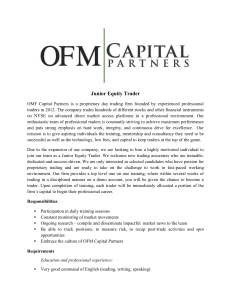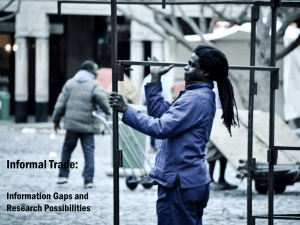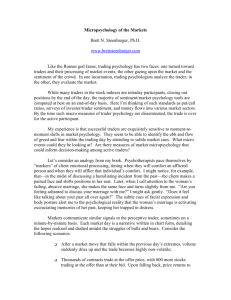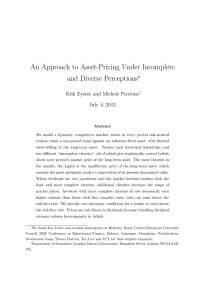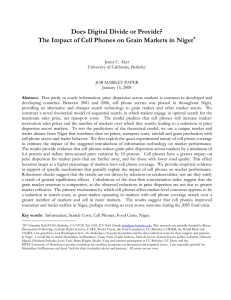Experts, Novices, and Trading Performance Brett N. Steenbarger, Ph.D.
advertisement
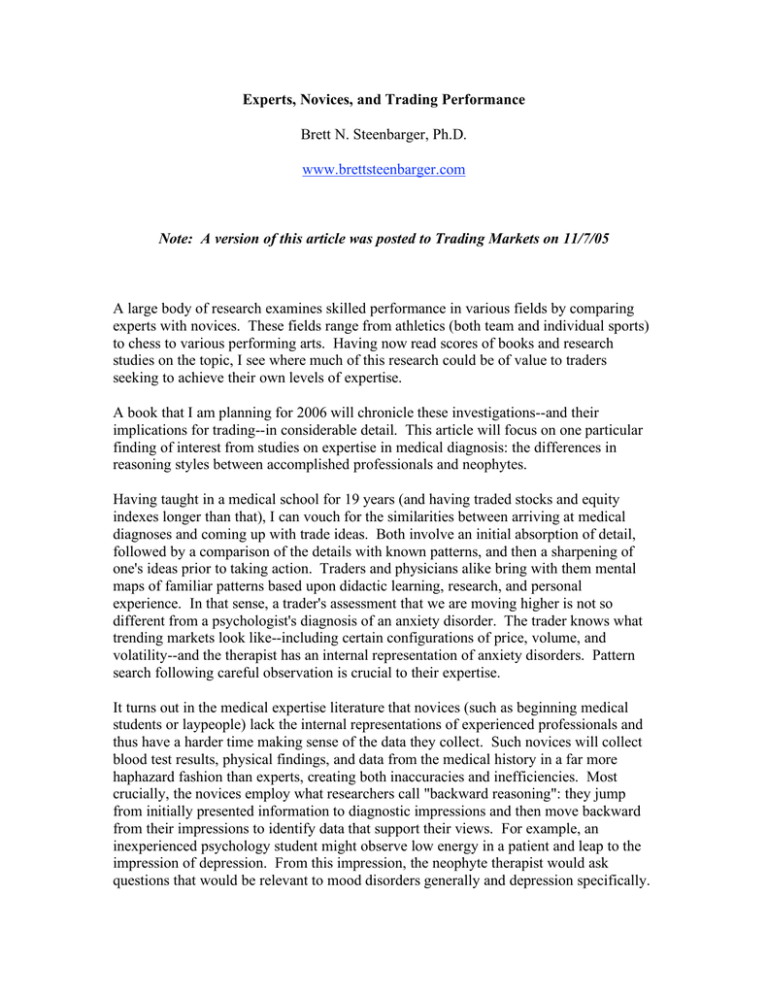
Experts, Novices, and Trading Performance Brett N. Steenbarger, Ph.D. www.brettsteenbarger.com Note: A version of this article was posted to Trading Markets on 11/7/05 A large body of research examines skilled performance in various fields by comparing experts with novices. These fields range from athletics (both team and individual sports) to chess to various performing arts. Having now read scores of books and research studies on the topic, I see where much of this research could be of value to traders seeking to achieve their own levels of expertise. A book that I am planning for 2006 will chronicle these investigations--and their implications for trading--in considerable detail. This article will focus on one particular finding of interest from studies on expertise in medical diagnosis: the differences in reasoning styles between accomplished professionals and neophytes. Having taught in a medical school for 19 years (and having traded stocks and equity indexes longer than that), I can vouch for the similarities between arriving at medical diagnoses and coming up with trade ideas. Both involve an initial absorption of detail, followed by a comparison of the details with known patterns, and then a sharpening of one's ideas prior to taking action. Traders and physicians alike bring with them mental maps of familiar patterns based upon didactic learning, research, and personal experience. In that sense, a trader's assessment that we are moving higher is not so different from a psychologist's diagnosis of an anxiety disorder. The trader knows what trending markets look like--including certain configurations of price, volume, and volatility--and the therapist has an internal representation of anxiety disorders. Pattern search following careful observation is crucial to their expertise. It turns out in the medical expertise literature that novices (such as beginning medical students or laypeople) lack the internal representations of experienced professionals and thus have a harder time making sense of the data they collect. Such novices will collect blood test results, physical findings, and data from the medical history in a far more haphazard fashion than experts, creating both inaccuracies and inefficiencies. Most crucially, the novices employ what researchers call "backward reasoning": they jump from initially presented information to diagnostic impressions and then move backward from their impressions to identify data that support their views. For example, an inexperienced psychology student might observe low energy in a patient and leap to the impression of depression. From this impression, the neophyte therapist would ask questions that would be relevant to mood disorders generally and depression specifically. Expert doctors, however, do not function this way. They employ "forward reasoning". They collect a wide range of data that are relevant to making differential diagnoses. Instead of jumping to a single conclusion, they have in mind several possible conclusions and collect the data needed to distinguish among them. Thus, for instance, the expert therapist would seek a blood workup and a full history and physical to accompany the usual psychosocial questions regarding mood. This is because the expert knows that low energy in a patient can be the result of hormonal imbalances, nutritional deficiencies, and disease processes--not just depression. Where the novice works backward from an initial impression, the expert assembles large amounts of data into clusters and narrows hypotheses until the best one remains. It is not unusual for traders to become married to market opinions: They get an idea in their head where they think the market is going and then they ignore information that tells them otherwise. I have watched traders selectively pick information from markets that confirms their biases while ignoring huge trends that are contradicting their ideas. Only after their markets close do these traders look back and wonder how they could have missed what was so obvious. I contend that the trader who is married to an opinion is behaving like novices in the medical expertise studies. They form an impressionistic view of their market and then search for evidence to support their bias. Expert traders, however, "let the market come to them": they gather enough information to sort out random movement from significant tendencies, eventually arriving at trade ideas that represent their diagnosis of the market. New traders, I've found, are like medical students in that they haven't received enough training and seen enough variations of patterns to know how to assemble data into differential diagnoses. Only with repeated experience do they learn to identify meaningful clusters of information and use these to sort plausible ideas from implausible ones. If this is true, trader education might need to more closely approximate medical education. Traditional medical education consists of a pre-clinical phase that teaches basic science fundamentals, so that students understand principles of anatomy, biochemistry, cell and molecular biology, pathology, and the like. After this comes a very different clinical phase where learning is at the bedside, with students encountering a variety of clinical cases and "reading up" on these. Traders, too, need a basic education in the fundamentals of auction markets and statistics, so that they understand the significance of bids, offers, volume, and price levels and patterns that appear over time. After the basics, however, traders learn at their equivalent of the bedside: by viewing markets under varying conditions and looking deeply into these. Ultimately, what physicians and traders learn is not just a fund of knowledge, but a method of reasoning. What makes a good trader may come less from the trade ideas themselves than from the forward reasoning process used to generate these ideas. Traders who keep journals and work on their performance may want to think about monitoring more than their moods, trades, and profits/losses. They also need to think about their thinking. Bio: Brett N. Steenbarger, Ph.D. is Associate Clinical Professor of Psychiatry and Behavioral Sciences at SUNY Upstate Medical University in Syracuse, NY and author of The Psychology of Trading (Wiley, 2003). As Director of Trader Development for Kingstree Trading, LLC in Chicago, he has mentored numerous professional traders and coordinated a training program for traders. An active trader of the stock indexes, Brett utilizes statistically-based pattern recognition for intraday trading. Brett does not offer commercial services to traders, but maintains an archive of articles and a trading blog at www.brettsteenbarger.com.
